Anthropology IAS Mains Question Paper 2022:
There are Eight questions divided into Two Sections. Candidate has to attempt Five questions in all. Questions no. 1 and 5 are compulsory and out of the remaining, any Three are to be attempted choosing at least One question from each section.
| Anthropology IAS Mains Question Paper- I |
Section- A:
1:- Write notes on the following in about 150 words each: (10 x 5 = 50)
(a) Debate between formalist and substantivist approaches
(b) Mesolithic rock art in Indian subcontinent
(c) Radcliffe-Brown’s ideas on status, role and institution
(d) Pedigree analysis in genetic counselling
(e) Participatory Rural Appraisal (PRA) and Participatory Learning and Action (PLA)
2:- (a) “Anthropology is the systematic, objective and holistic study of human kind in all times and places.” Elaborate the argument. (20)
(b) Discuss different forms of primate social organisation. (15)
(c) Discuss with suitable examples the typo-technological problems in Indian palaeolithic industry with reference to environmental hypotheses. (15)
3:- (a) Discuss how the rules of descent contradict the principles of residence in matrilineal society, mentioning suitable examples? (20)
(b) Enumerate the evidence of animal domestication in Indian microlithic industry. (15)
(c) Should we still distinguish between ‘classic’ and ‘progressive’ Neanderthals? Discuss the controversy surrounding Neanderthal’s position in human evolution. (15)
4:- (a) Why Heath and Carter used anthropometric measurements instead of photographs of an individual to assess the somatotype? Elaborate their method. (20)
(b) Discuss the historical and cultural contexts that led to superseding ethnocentrism with cultural relativism in anthropology. (15)
(c) Critically examine various anthropological interpretations about the Kula Ring. (15)
Section- B:
5:- Write notes on the following in about 150 words each: (10 x 5 = 50)
(a) Balanced and transient genetic polymorphism
(b) Genetic imprinting in human diseases
(c) Stages of human pre-natal development
(d) Shaman, sorcerer and medicine man
(e) Household and domestic group.
6:- (a) Discuss the mechanism of social control in different kinds of political systems. (20)
(b) What is meant by health? Is the burden of life style diseases on the rise? Justify your answer with suitable examples. (15)
(c) Critically evaluate the reasons of reduction in age at menarche in human females over the successive generations. (15)
7:- (a) Discuss the role of evolutionary forces in creating human diversity. (20)
(b) Write the historical development of field work tradition in anthropology till recent times. (15)
(c) Discuss the approaches of Leslie White, Julian Steward and Marshall Sahlins in the light of cultural evolution. (15)
8:- (a) Discuss the contemporary population problems in the light of various socio-cultural demographic theories. (20)
(b) What do you understand by blood group systems? How is HLA system different from those based on red cell antigens ? (15)
(c) Discuss how anthropological knowledge of the human body may be used in designing equipments and articles of human use. (15)
| Anthropology IAS Mains Question Paper- II |
Section- A:
1:- Write notes on the following in about 150 words each: (10 x 5 = 50)
(a) Pit-dwellers of Kashmir
(b) Varna and Buddhism
(c) Dharma versus Religion
(d) Safeguards for linguistic minorities in India
(e) Westernisation and Modernisation
2:- (a) Illustrate the contribution of Irawati Karve to Indian Anthropology. Make a special mention of her literary contribution. (20)
(b) What are the arguments for excluding Narmada Man from Homo erectus category? (15)
(c) Critically describe Dr. B. R. Ambedkar’s argument on the origin of Indian caste system. (15)
3:- (a) Make a critical appraisal of Megalithic tradition in India with special reference to North-East India. (20)
(b) Assess the contributions of S.C. Dube in Indian village studies. (15)
(c) Describe the methods adopted by Sir Herbert Hope Risley in classifying Indian populations. What are the criticisms against Risley’s classification? (15)
4:- (a) “Globalisation, on one hand has provided opportunities and on the other hand thrown challenges to Indian Villages.” Elucidate. (20)
(b) Describe briefly the proto-history of Gujarat. Discuss the significance of Gujarat proto-history in international trade. (15)
(c) Critically examine ‘Indigenisation of Christianity’ in India. (15)
Section- B:
5:- Write notes on the following in about 150 words each: (10 x 5 = 50)
(a) Regionalism as an opportunity and threat to national integration
(b) Issues of tribal agricultural labourers
(c) Major problems of nomadic and semi-nomadic groups
(d) Role of the Governor in the Fifth Schedule areas
(e) Austroasiatic languages
6:- (a) Discuss the objectives of Integrated Tribal Development Projects (ITDPs). How far have these objectives been achieved? (20)
(b) Compare the functioning of traditional ‘Tribal Council’ with that of ‘Gram Sabha’ under PESA. (15)
(c) Explain how British policies impacted the major resources of the tribals. (15)
7:- (a) Discuss the views of G.S. Ghurye and Verrier Elwin on the approach towards tribal populations. What are the policies of the Government of India towards Indian tribal populations? (20)
(b) Discuss the issues and solutions related to the Scheduled Caste and the Scheduled Tribe populations in India. (15)
(c) Explain the social and religious consequences of contact between tribal and non-tribal populations. (15)
8:- (a) Compare the nature of tribal movements between North-East and Central India. Briefly mention the current status of existing tribal movements in these areas. (20)
(b) Briefly describe the anthropological perspective on development. How have anthropologists contributed in India’s rural development? (15)
(c) How can a balance be struck between livelihood concern and environmental degradation in the context of shifting cultivation? (15)
| Tribe-Caste Continuum Concept of Sacred Complex Concept of Westernization Concept of Sanskritization Concept of Varna Neanderthal Man Types of Exchange in Economic Anthropology Download Anthropology IAS Mains Question Paper 2022: Paper- I and Paper- II |
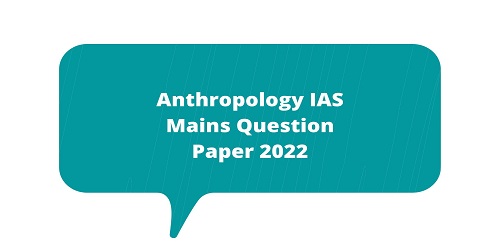
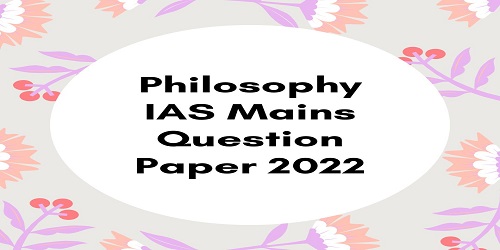
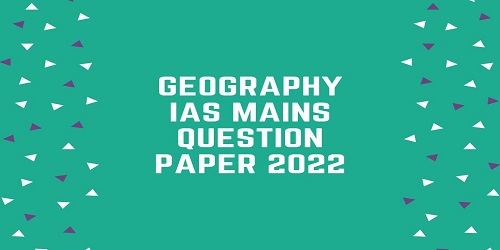
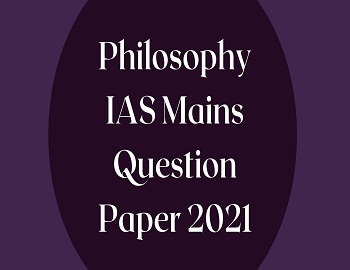
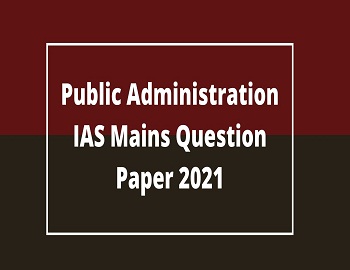

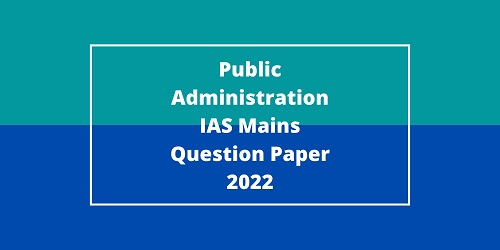
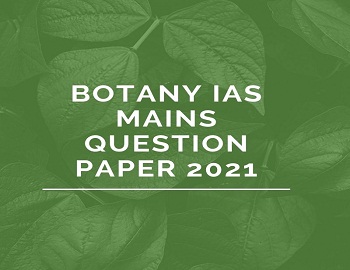
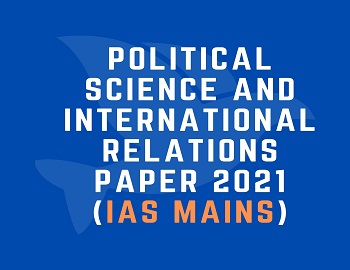
Comments (No)